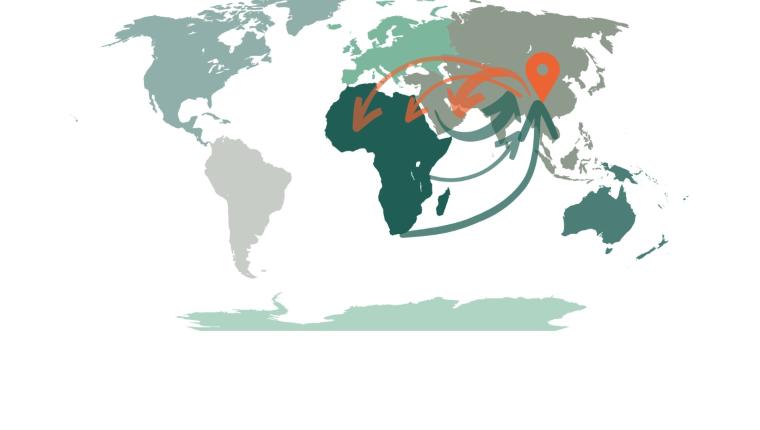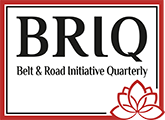
The Belt and Road Initiative Quarterly (BRIQ) is currently inviting scholarly articles for inclusion in its upcoming Summer 2024 edition. The thematic focus of this issue revolves around the intricate nexus of the Belt and Road Initiative (BRI) with the Islamic World, encompassing multifaceted explorations of economic, geopolitical, and cultural interactions.
Lately, the pursuit of hegemonic policies in the Global North has been a driving force behind considerable regional and global instability. In the meantime, the rise of multipolarity has provided emerging nations with opportunities to confront the challenges that lie ahead. Against this backdrop, the events transpiring in West Asia (or the Middle East) and North Africa have been gaining increasing significance. These regions stand as a key arena where the global geopolitical power struggle is intensifying, and their status as home to a predominantly Muslim population adds further complexity to the current situation.
Profound shifts have been witnessed in the policy orientations of West Asian and North African nations since the Cold War era. These transformative shifts carry ramifications not solely confined to the regional sphere but also extending to the global arena. It is evident that such alterations have led to an augmentation of these nations' strategic autonomy as compared to preceding epochs, concurrently facilitating a gradual change in their affiliations and partnerships.
Within this context, the emerging nexus between China in the East and the predominantly Muslim nations across Asia and North Africa in the West is deemed a noteworthy phenomenon. China's growing engagement in development cooperation with countries across West Asia and North Africa carries considerable significance. Equally significant is China's role as a mediator in the region, as evidenced by its contribution to facilitating the resolution of the Saudi-Iran confrontation.
The BRI assumes a pivotal role in shaping the dynamics between China and Islamic nations, which share analogous historical trajectories and development needs as part of the developing world. The prospects presented by the BRI have led to the emergence of shared aspirations among emerging economies concerning the broader trajectory of global affairs. These aspirations include the reinforcement of South-South collaboration, the promotion of multilateralism, resistance against hegemonic agendas, the rejection of unilateral impositions, and the re-organization of international relations on a more democratic basis.
The BRI is founded upon a comprehensive scheme of international cooperation that promotes closer interactions among populations from diverse cultures, traditions, and belief systems, many of which have been the birthplaces of ancient civilizations. In this context, the significance of fostering inter-civilizational harmony and collaboration within the BRI takes on heightened significance as a determining factor in the world's future trajectory.
With these observations in mind, our forthcoming issue is set to feature a diverse range of original and scholarly content, comprising academic articles, expert viewpoints, essays, and book reviews on the following topics:
- The BRI's influence on economic, political, and cultural dynamics in the Islamic World
- Assessing the BRI's geopolitical ramifications in the West Asia/Middle East and Africa
- China's Global Civilization Initiative and its implications for relations with the Islamic World
- Exploring the interface between the Global Development Initiative and the Islamic World
- Tracing the BRI’s reflection from the Islamic World to Western Perceptions
- Evaluating the Global Security Initiative and its pertinence to dynamics within the Islamic World
- Analyzing China's multifaceted engagements with West Asian and North African nations, including political, economic, diplomatic, cultural, and military relations
Submission Guidelines
BRIQ (Belt & Road Initiative Quarterly) is a scholarly journal of international politics, economy, and culture. Belt and Road Initiative Quarterly (BRIQ) features a broad range of content, from academic articles to book reviews, review essays, interviews, news reports, and feature articles.
The Editorial Board can issue calls for papers for special issues and invite authors to contribute manuscripts; however, it also welcomes unsolicited submissions.
Submissions are invited in English or Turkish. All submissions are to include a short biography (150-word limit) and should be sent as Microsoft Word attachments to briq@briqjournal.com . Articles or other content that have been previously published or are under review by other journals will not be considered for publication. BRIQ follows American Psychology Association style (6th edition, https://www.apastyle.org) and uses American English spelling.
BRIQ uses a double-blind review process for all academic articles. Academic articles should be between 5,000 and 9,000 words in length, including abstracts, notes, references, and all other content. Please supply a cover page that includes complete author information, and a fully anonymized manuscript that also contains an abstract (200- word limit) and 5 keywords. Book reviews should not exceed 1,000 words; review essays covering two or more works can be up to 3,000 words. News reports consisting of brief analyses of news developments should not exceed 1,500 words; feature articles combining reporting and analysis can be up to 3,500 words. Please contact the Editorial Board for interview proposals.
